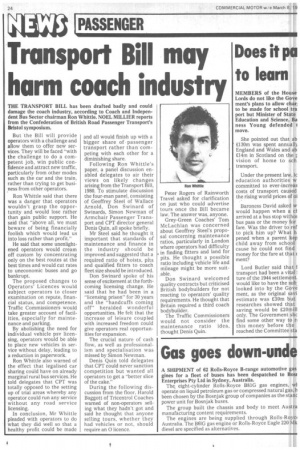Transport Bill may harm coach indust
Page 26

If you've noticed an error in this article please click here to report it so we can fix it.
THE TRANSPORT BILL has been drafted badly and could damage the coach industry, according to Coach and Independent Bus Sector chairman Ron Whittle. NOEL MILLIER reports from the Confederation of British Road Passenger Transport's Bristol symposium.
But the Bill will provide operators with a challenge and allow them to offer new services. They will be faced "with the challenge to do a competent job, win public confidence and attract new traffic, particularly from other modes such as the car and the train, rather than trying to get business from other operators.
Ron Whittle said that there was a danger that operators wouldn't grasp the opportunity and would lose rather than gain public support. He said that "above all, we must beware of being financially foolish which would lead us into loss rather than profit."
He said that some unenlightened operators would cream off custom by concentrating only on the best routes at the best times and would cut rates to uneconomic buses and go bankrupt.
The proposed changes to Operators' Licences would subject operators to closer examination on repute, financial status, and competence. Traffic Commissioners would take greater account of facilities, especially for maintenance and parking.
By abolishing the need for individual vehicle psv licensing, operators would be able to place new vehicles in service without delay, leading to a reduction in paperwork.
Ron Whittle also warned of the effect that legalised car sharing could have on already marginal rural bus services. He told delegates that CPT was totally opposed to the setting up of trial areas whereby any operator could run any service without any road service licensing.
In conclusion, Mr Whittle pleaded with operators to do what they did well so that a healthy profit could be made and all would finish up with a bigger share of • passenger transport rather than competing with each other for a diminishing share.
Following Ron Whittle's paper, a panel discussion enabled delegates to air their views on likely changes arising from the Transport Bill, 1980. To stimulate discussion the four-man panel, consisting of Geoffrey Steel of Wallace Arnold, Don Swinard of Swinards, Simon Newman of Armchair Passenger Transport and CPT director general Denis Quin, all spoke briefly.
Mr Steel said he thought it important that standards of maintenance and finance in the industry should be improved and suggested that a required ratio of hoists, pits and qualified fitters to coach fleet size should be introduced.
Don Swinard spoke of his sense of excitement at the forthcoming licensing change. He said that he had been in a "licensing prison" for 30 years and the "handcuffs coming off" heralded wonderful opportunities. He felt that the increase of leisure coupled with increased freedom could give operators real opportunities for expansion.
The crucial nature of cash flow, as well as professionalism and specialisation was missed by Simon Newman.
Denis Quin told delegates that CPT could never sanction competition but wanted all operators to get a "better slice of the cake."
During the following discussion from the floor, Harold Baggott of Tricentrol Coaches warned of non-operators selling what they hadn't got and said he thought that anyone selling tours, whether they had vehicles or not, should require an 0 licence. Peter Rogers of Rainworth Travel asked for clarification on just who could advertise tours once the Bill became law. The answer was, anyone.
Grey-Green Coaches' Tom McLachlan was concerned about Geoffrey Steel's proposal concerning maintenance ratios, particularly in London where operators had difficulty in finding fitters and land for pits. He thought a possible ratio including vehicle life and mileage might be more suitable.
Don Swinard welcomed quality contracts but criticised British bodybuilders for not reacting to operators' quality requirements. He thought that Britain required a third coach bodybuilder.
The Traffic Commissioners would not consider the maintenance ratio idea, thought Denis Quin.












































































































































































